
Tech on the Move
Tech workers are willing and ready to move for the right job, especially if it’s to an area with low cost of living, desirable climate and shorter commute times.
Not even the brightest IT mind, robot or algorithm could have predicted the severity of disruption the UK (and indeed, the world) would experience in 2020. From a global pandemic to political unrest and widespread economic downturns, the chaos this year has yielded is unlike any in recent memory. Yet, technology—with its inherent challenges and despite rising criticism—has given us a sense of normalcy in our lives. When going into offices and schools suddenly could jeopardize our health and personal well-being, the internet provided a virtual, makeshift refuge in which we could, to varying degrees, perform our jobs, teach our children, and keep our communities connected.
But some were not as fortunate. They either did not have the option to work from home or were caught up in mass layoffs and furloughs on a scale the UK has never seen. But we all relied on digital tools to do things like access critical information and news, make essential purchases, and communicate with loved ones from whom we were physically cut off.
Those of us in IT are fortunate; our work often affords us a level of flexibility and safety that others don’t enjoy. Therefore some of the trends on which we report, like IT jobs growth and the types of roles that are in demand in certain areas, can reasonably be expected to remain stable for the foreseeable future in spite of changing external factors. Others, like cost of living and median salary, are proving to be deeply subject to the greater market trends and the impacts of the pandemic. This is our second CompTIA UK Tech Town Index®; however, and we know that a single year of comparison, does not a trend make. So we’ve taken great care to look at each city in its own right and explore the pros and cons of living and working in each.
This year, we see Leeds bumping Manchester down the list and topping the list of UK Tech Towns, thanks to its low cost of living, booming IT jobs scene, and overall affordability. We also welcome newcomer Belfast to the list, noting a wealth of global IT companies there, as well as strong local dominance in the field of cybersecurity. London, having suffered a particularly difficult year, finds itself lower on the list than in 2019, but still holds its appeal as a top destination for IT professionals, tech businesses, and global investors. Cities like Bristol and Edinburgh remain firmly planted on the list, with an admittedly high cost of living, but with a level of appeal and quality of life that is difficult to match. And others still like Reading and Bath find themselves lower on the list, having been impacted by a difficult combination of high cost of living, average jobs growth, and low or average median wages.
This year, we also take a look across the entirety of the UK’s work-from-home and remote jobs landscape. We would be remiss if we didn’t focus on the widespread opportunity that exists now for technology workers to perform their jobs from anywhere and to consider what impact that new reality may have on the future of the UK’s IT sector. While we are all watching and eagerly awaiting the end of a pandemic that has wreaked havoc on our lives, we also acknowledge that the remote working trend is unlikely to go away, even once COVID-19 is no longer a threat.
Each of this year’s Tech Towns, as well the remote space that allows people to work from any city or town in the UK, affords local workers a dramatically different way of life and deserves to be considered for its unique merits. We hope this list will prove useful in reminding readers that the UK continues to be a global hub for all things IT, with much innovation and entrepreneurship to be found, even during a global pandemic. Despite a challenging year and the many unknowns in our future, the UK has the opportunity to tap into the tech sector’s collective talent to help us become even better and stronger still.
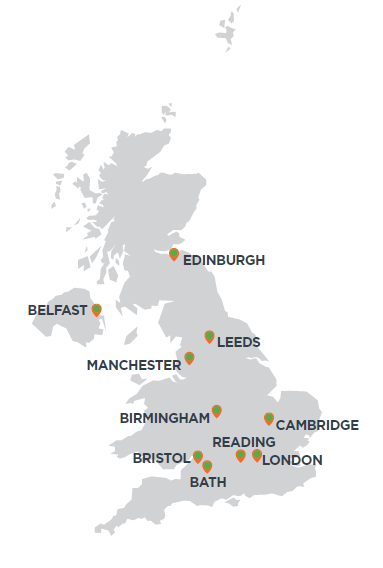
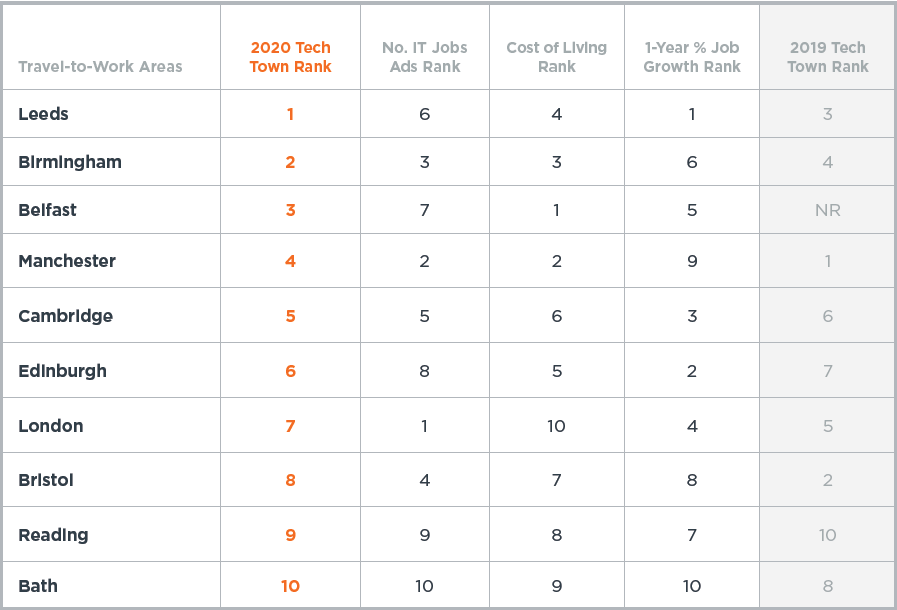
This small-but-mighty West Yorkshire city has skyrocketed to the top position on our list, up from No. 3 in 2019. With its appealing size and manageable cost of living, it’s no wonder Leeds is performing so well in the IT jobs landscape and attracting new talent daily. From September 2019 to August 2020, 11,348 IT jobs were posted in the Leeds travel-to-work area. Much like other cities on the list, programmers and software development professionals were in high demand here, along with IT business analysts and systems designers. The cost of living in Leeds is admirably low, with the average house in the area priced at £197,026, compared to the UK average of £239,196. The affordability of Leeds, combined with its respectable median wage of £41,360 (compared to £51,748 in London, where the average house is nearly 2.5x more), is certainly a contributor to its status as our leading Tech Town for 2020. Also contributing is the growth of jobs here. From 2020 to 2021, 2.1% job growth is expected across the city, putting it squarely in first place for this factor alone.
The economy of Leeds is reported to be the most diverse of all the UK’s main employment centres, with the highest reported rate of private-sector jobs growth of any city in the UK. Over the next 10 years, its economy is predicted to grow by some 25%, meaning it could fare well on our list for years to come. The National Health Service is the city’s main employer posting IT jobs, followed closely by the University of Leeds, British-owned grocery chain ASDA, Leeds City Council, and the Department for Work and Pensions (DWP Digital), whose mission is to digitally transform many of the public services upon which millions of UK citizens depend. Leeds’ geographical location, 170 miles from London, makes it within easy striking distance of a major world capital, but far removed enough to have a distinct flavour of its own. Anyone eyeing Leeds as a relocation destination can expect world-class shopping (it is home to one of the country’s largest pedestrianised shopping areas), a strong university presence (the city boasts two internationally acclaimed universities), and easy access to the hilly beauty of the Yorkshire countryside. That is, of course, in addition to the strong Yorkshire dialect and distinctly Northern way of life that permeates the region! Yorkshire pud’, anyone?
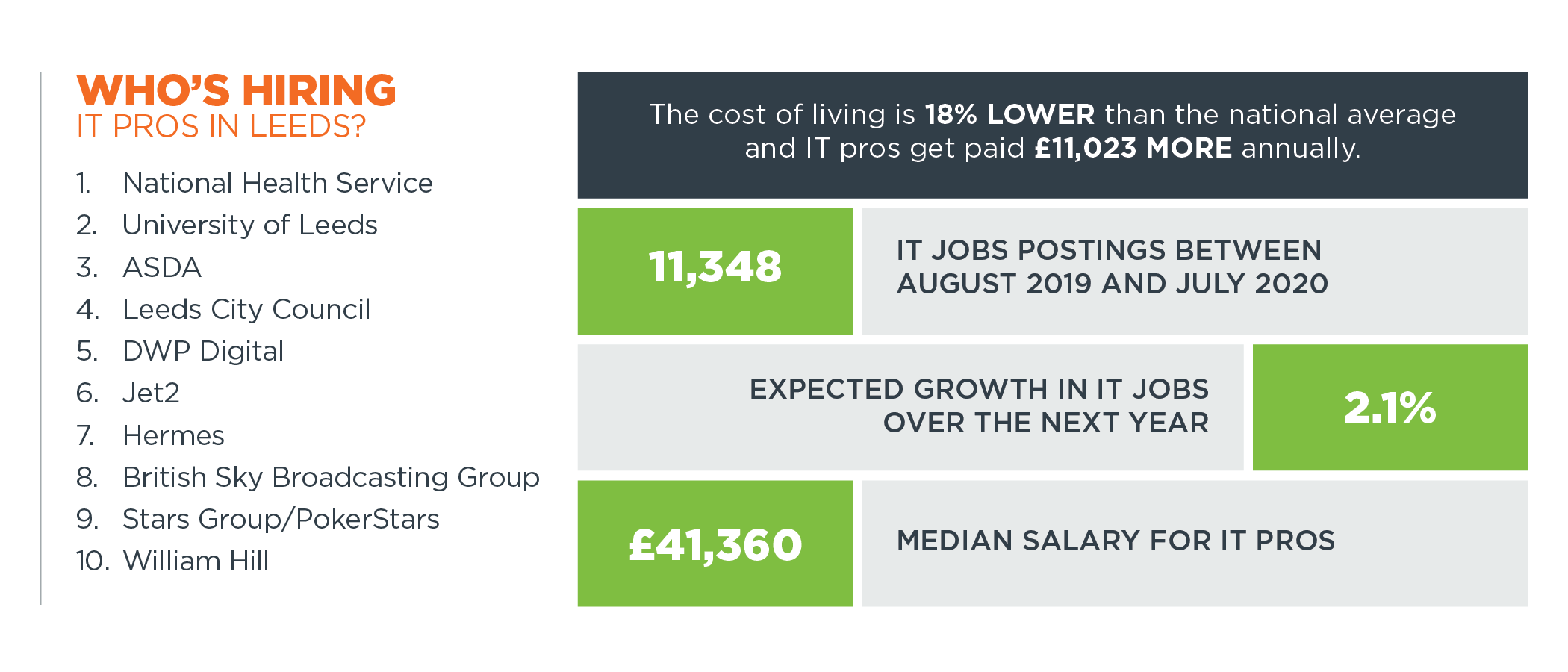 Back to top
Back to top
Last year, “Brum”, home to 4.3 million people within its metropolitan area, sat at No. 4 on our list, but now can rightly claim to be the second-best UK city for IT professionals and employers. This West Midlands hub has long been known as the City of a Thousand Trades since its status as the first manufacturing town in the world was sealed in 1889, and IT is among its most lucrative sectors today.
Nearly 20,000 IT jobs were posted in Birmingham in the last year. The local employers posting the most IT jobs include the National Health Service, the University of Birmingham, and Intouch Games—a world leader in the mobile gaming and eGaming sector. In fact, the West Midlands region is home to more than 3,500 employees in the gaming sector alone, making it a major UK player in this space. Other digitally savvy firms in the area include Specialist Computer Centres, Advanced Computer Software Group, and international names like PwC and Deutsche Bank, reflecting the breadth and calibre of companies that have chosen to set up shop here. While wages vary based on many factors besides location, IT job seekers in the Birmingham area can expect to earn a median salary of £42,226, which is a significant 39% higher than the UK average for all occupations (£30,337).
Birmingham is by no means a small city, but it offers many of the perks one might expect in a less populous area. Housing is relatively affordable. The average house costs just £189,988, well below the national average and higher only than Belfast and Manchester in affordability. Birmingham is one of the country’s greenest cities, with more than 600 parks and open spaces, and the city has more canals than Venice (65 kilometers of waterway, to be precise). For business travelers, London is just two hours away, but Birmingham boasts its own international airport, where global flag carriers like Emirates, Air France and Lufthansa are represented.
Perhaps among the biggest contributors to Birmingham’s success in IT is its proximity to a staggering 18 universities. Among them, of course, is Birmingham University, which is one of the country’s top 15 ranked institutions for computer science and offers a diverse array of courses in computing, robotics and artificial intelligence. The city’s flagship university also yields an impressive score of 97% for the research intensity of its programs and a 93% positivity for the employment prospects of its graduates.
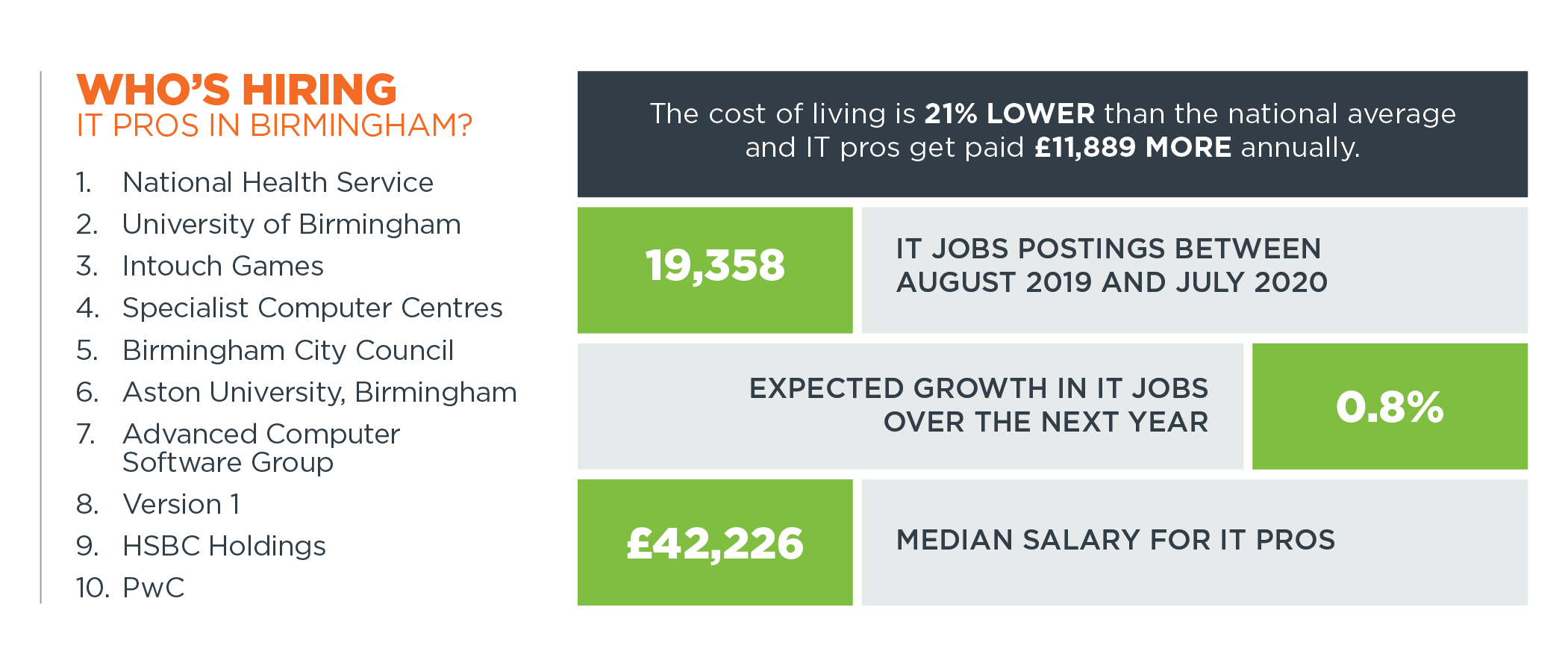 Back to top
Back to top
We are pleased to welcome the city of Belfast to the UK Tech Town Index for the first time. Given the booming IT landscape in this Northern Irish city, it’s no surprise that it has jumped straight up the list, making its debut at No. 3. In the past year, more than 11,000 IT jobs were posted across the travel-to-work area for Belfast, with programmers, software development professionals, and IT business analysts and architects in highest demand. Multinational corporations Citigroup, Allstate Northern Ireland, Deloitte and PwC are among the city’s top employers advertising IT jobs, reflecting Belfast’s appeal as an investment hub. Other top employers include the historic Russell Group institution, Queen’s University Belfast. This university has been awarded Northern Ireland’s first Regius Professorship, awarded by The Queen for excellence in electronics and computer engineering. In particular, Queen’s University has a world-class reputation for its work in global cybersecurity.
Belfast boasts an enviable cost of living for a capital city, with the average property price standing at just £135,523 (compared to the London average of £489,159 or the Edinburgh average of £284,654). This places Belfast at No. 1 on our list for affordability alone. When you consider that the median annual IT wages here (£38,278) are 26% greater than the national average across all occupations, the attraction of the city for IT professionals makes perfect sense.
The startup scene in Northern Ireland has been booming in recent years, particularly in the healthtech, fintech and cybersecurity sectors. Tech Nation reports that the city of Belfast’s digital sector employs more than 60,000 people, meaning around a fifth of its workforce is employed in tech. In 2018, fDi Intelligence listed Belfast as the most business-friendly small- to-medium-sized city, and also gave it recognition as being among the world’s Top 10 Digital Economies of the Future. In spite of Northern Ireland’s troubled past, this city is becoming a bright star for all things digital and a hot spot for IT professionals looking to work for some of the world’s biggest and most innovative companies.
Anyone eyeing Belfast as a relocation city can look forward to an architecturally diverse skyline and an array of world-class museums all housed in the city’s dockside Titanic Quarter. Caves, meadows and archaeological sites surround the city for lovers of nature and history.
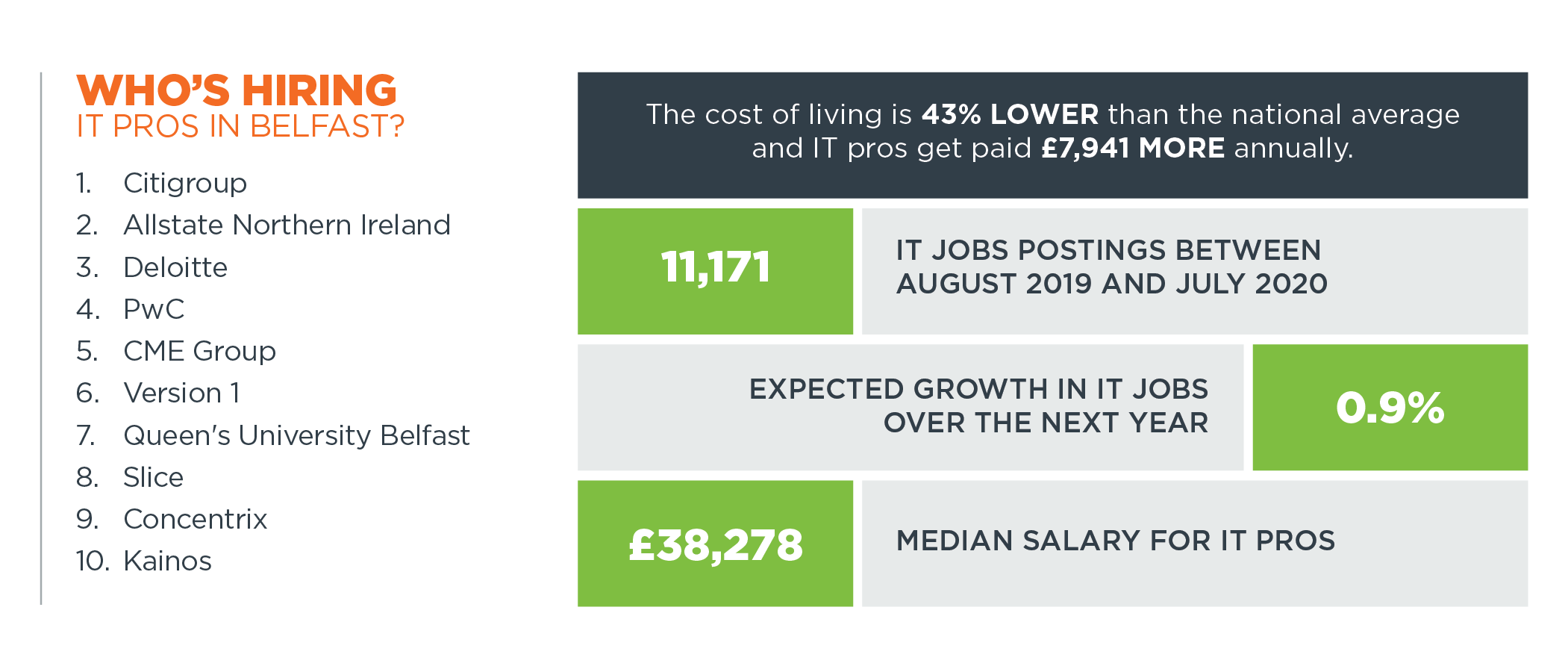 Back to top
Back to top
Last year’s top Tech Town has slid down in the rankings in 2020, with a number of possible factors contributing. Stiff competition from newcomer Belfast and established tech cities like Birmingham have made for tight margins of comparison. And as we predicted last year, the growth powering Manchester is proving to be a double-edged sword. While it has historically been an affordable place to call home, the average cost of a home in this northern city now sits at around £182,230, up from the £172,186 we reported last year. This price hike has likely been fueled by newly built housing developments and a large influx of new residents moving to the area. As cited in last year’s report, around 80,000 new residents are expected to move into Manchester’s new quarters by 2024, although it remains to be seen how or if the COVID-19 pandemic will impact these numbers.
Those factors notwithstanding, Manchester remains firmly seated on our list and will likely be a top IT destination for the UK for years to come. The employers posting the most IT jobs are the National Health Service, followed by British e-commerce company The Hut Group. Also on the list are telecommunications company TalkTalk Group, the British government’s Department for Work and Pension (DWP), and British-Swedish pharma giant AstraZeneca. As for the tech startup scene, Manchester is making a name for itself in AI and machine learning, and is home to startups like Toottoot (a psychological wellbeing software), Arctic Shores (creators of next-gen psychometric testing), and Cubic Motion (experts in facial animation for the gaming world).
This city is among the fastest growing in Europe and offers strong urban appeal for anyone looking to relocate here. While once little more than a textile/industrial hub, Manchester’s status as a cultural destination seems to have been cemented. It boasts a massive array of diverse restaurants, an impressive theatre, music and arts scene (the Manchester Arena is one of the largest music venues in Europe), and the city claims to be the sporting capital of the entire UK (some say the world, but we’ll leave that to our readers to judge).
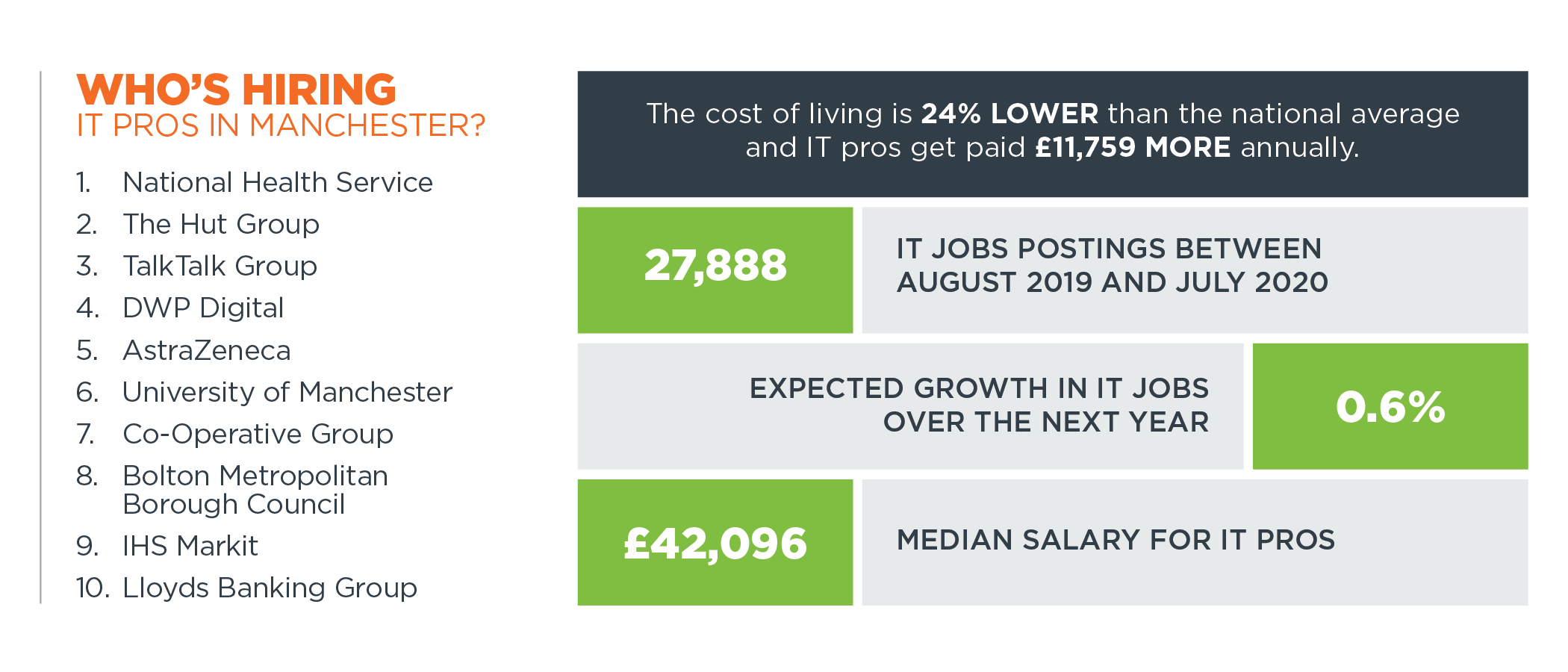 Back to top
Back to top
Up slightly from No. 6 in last year’s report, delightfully academic Cambridge, with its “Silicon Fen” cluster of tech companies, remains a top destination for IT minds from the UK and around the world. Pharma giant AstraZeneca is the employer posting the most IT jobs in this area, followed (unsurprisingly) by the globally renowned University of Cambridge, the National Health Service, semiconductor and chip design company Arm Holdings, Amazon, and Cambridge Wireless. Highly specialized global tech players like Raytheon and the European Molecular Biology Laboratory also top the list of locally established employers hiring in IT. Cambridge—specifically Silicon Fen—has been named Europe’s largest technology cluster, a title which hopefully will remain intact following the pandemic. In fact, given the area’s strong pharma and AI footprint, we can rest assured that some of the brightest minds in Cambridge are rapidly working towards a vaccine for COVID-19.
From September 2019 to August 2020, more than 13,000 IT jobs were posted in the travel-to-work area for Cambridge, with a noticeable need reflected in the job listings for programmers and software development professionals. Anyone relocating to Cambridge can expect a delightful skyline marked by medieval university halls and green spaces, but also permeated by new-age buildings that are inhabited by some of the world’s most cutting-edge companies—such is the paradox of life in an Oxbridge town. Yet, anyone hoping to live and work here will have to pay to play; the average home in this idyllic town is anything but cheap at £296,894. Wages for IT pros in the Cambridge area sit at £47,151 (median), which is certainly well above the national average, but whether or not it’s high enough to justify the cost of living is, clearly, up to the individual.
Cambridge is home to its fair share of global brands, but part of the town’s appeal is its scrappy and well-heeled spirit of innovation. In fact, Europe’s “Hottest Startup of 2020” (so named at the annual Europa Awards) is FocalPoint, a GPS-tracking and company headquartered in Cambridge. Other Cambridge-based startups have been named “worth watching” in 2020 and beyond, including investment platform SyndicateRoom, antibody and proteomics research firm Abcam, and AI-powered rare disease treatment company Healx. Those fortunate IT pros living in and around Cambridge benefit from rapid transportation links into London, with the fastest train journey to London King’s Cross taking just 49 minutes. That means, of course, anyone working in Cambridge can enjoy the idylls of a quaint university town, but be within striking distance of the bustle of a world capital.
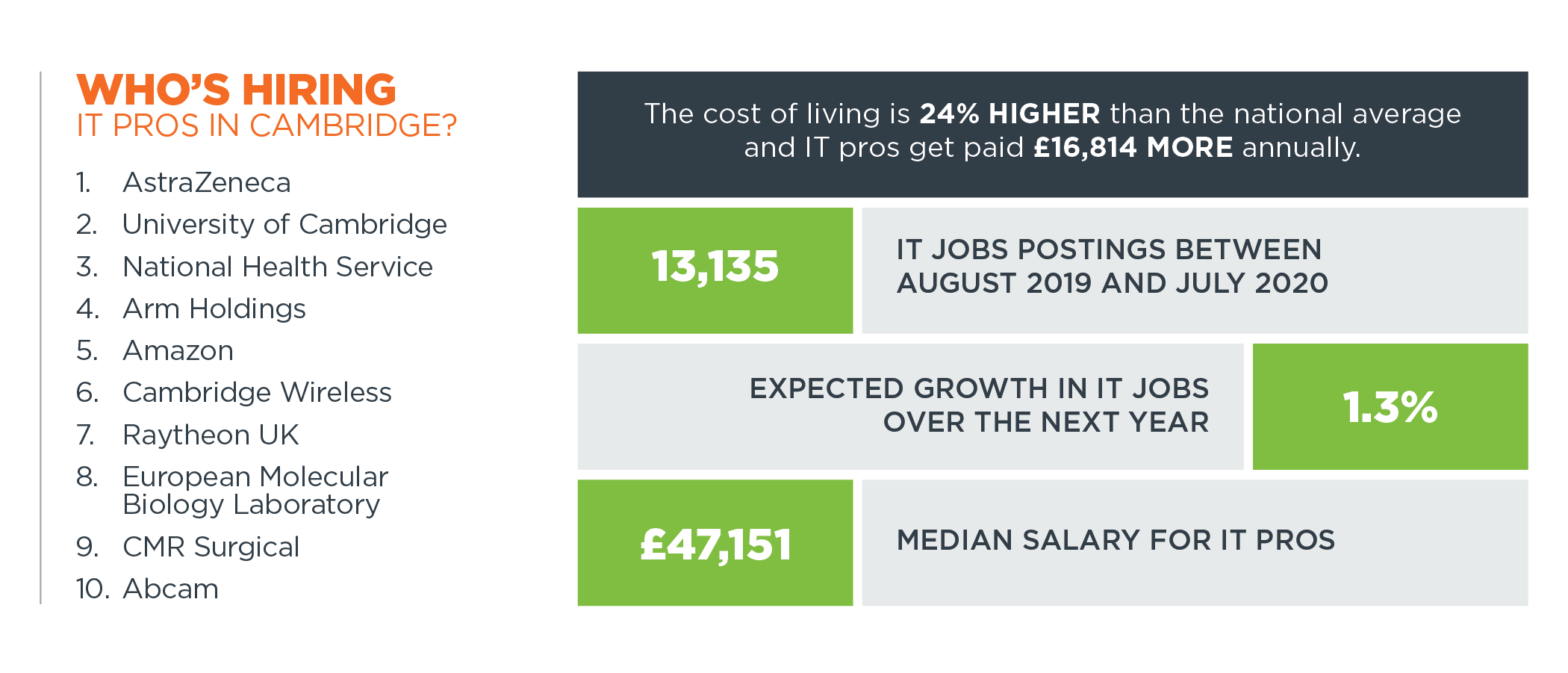 Back to top
Back to top
Auld Reekie (or Old Smoky, as Edinburgh is sometimes called) has moved up a place from our 2019 list. The cost of living here certainly isn’t cheap (the average house costs £284,654, which is miles above the Scottish average of £155,191), but with so many perks of living in this glorious northern city, it’s safe to say many people think it’s a fair tradeoff. IT pros in Edinburgh can expect to earn a median of £41,738 (38% higher than the national average across all occupations), and the city’s IT employers posted nearly 11,000 jobs. Furthermore, an IT job growth rate of 2% is projected for the one-year period 2020 to 2021. In fact, in terms of jobs growth alone, Edinburgh is No. 2 on our list, second only to Leeds.
The list of employers posting the most IT jobs in Edinburgh is permeated by banks—like Royal Bank of Scotland, Lloyds Banking Group, HSBC Holdings, and countless others—reflecting the financial gravitas of this city. Other employers with big IT needs include the prestigious University of Edinburgh, the National Health Service, Amazon, high-tech aerospace and defence company Leonardo Group, and UK grocery chain Sainsbury’s. Many established companies are deeply rooted here, but the city (and all of Scotland) is also a breeding ground for tech investment and grass-roots entrepreneurship. In fact, two tech “unicorns” (fintech startups Aveni and SquareBook, each valued at over $1 billion) emerged in Edinburgh in the last year alone. Tech Nation reports that Scotland’s total VC investment landscape in 2019 amounted to an impressive £200m—twice that of Northern Ireland, for example.
Anyone hoping to relocate to Edinburgh can expect to enjoy a highly liveable and cultured (if perhaps a bit rainy) city that boasts good transport links and is home to the Edinburgh Fringe Festival—the world’s largest arts festival. It is also listed as the greenest city in the UK and, in spite of its nickname, is among the least polluted. Tech pros will be right at home here among like-minded workers and students. Edinburgh is home to CodeBase—the UK’s largest tech incubator—and also to CodeClan, Scotland’s first accredited digital skills academy.
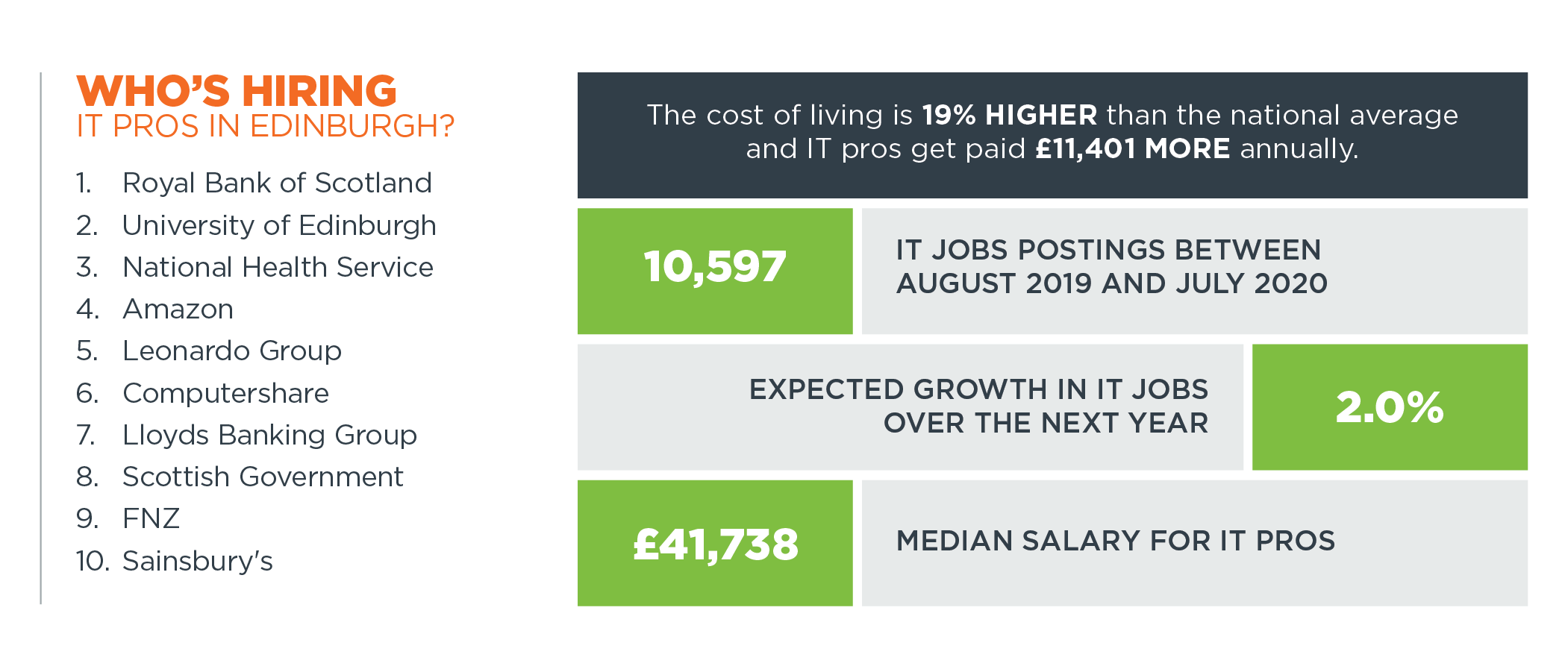 Back to top
Back to top
London, in large part due to its size and population density, has perhaps been disproportionately affected by the COVID-19 pandemic, relative to the rest of the UK, and has moved down two places since our 2019 report. With furloughs and layoffs impacting Londoners from March onwards, and with a cost of living that is already 105% greater than the national average, many Londoners have felt more than just a little pinch of what it means to live in a tightly packed world capital during a global crisis. Yet, Londoners have always been known for their resilience, and the IT sector in London is no different. In fact, in spite of the difficult year, there were more than 150,000 IT job vacancies advertised in the travel-to-work area of London, with 35 IT job postings per 1,000 people employed for the last 12 months. The pervasive digital savvy of this city’s employers and workers may be among its saving graces during these difficult times as more people have been asked to work from home and cease travel for the foreseeable future. (In other words, when the going gets tough, Londoners look to tech to solve problems.)
IT workers in London have a median annual wage of £51,748 (71% higher than the national average across all occupations), which somewhat offsets the extremely high cost of living. The companies in London posting the most IT jobs are, unsurprisingly, almost all multinational corporations. Deloitte, Amazon, HSBC Holdings, Bloomberg, Slalom Consulting, JPMorgan Chase, Capgemini, EY, and KPMG form nine of the top 10, with the National Health Service being the only outlier. Yet, further down the list we see an incredible diversity of companies, representing everything from small cleantech and AI businesses, to plant-based online food delivery services. The continued diversity of London’s business and investment scene proves that if you have a good enough idea and deep enough pockets (or investment money), your entrepreneurial dreams can come true here.
A constant revolving door of international talent gives London a major boost that other UK cities simply can’t rival. Part of that, of course, is thanks to the 40 universities and higher education institutions that sit within the greater London area. Silicon Roundabout—the city’s tech region in which startups and giants alike operate—serves to remind talented prospective graduates in London that they need not go far to find employment. It is safe to say that, for the foreseeable future and in spite of whatever hardships exist, London’s size, tech infrastructure, and diversity will keep it a top destination for anyone hoping to study or work in IT.
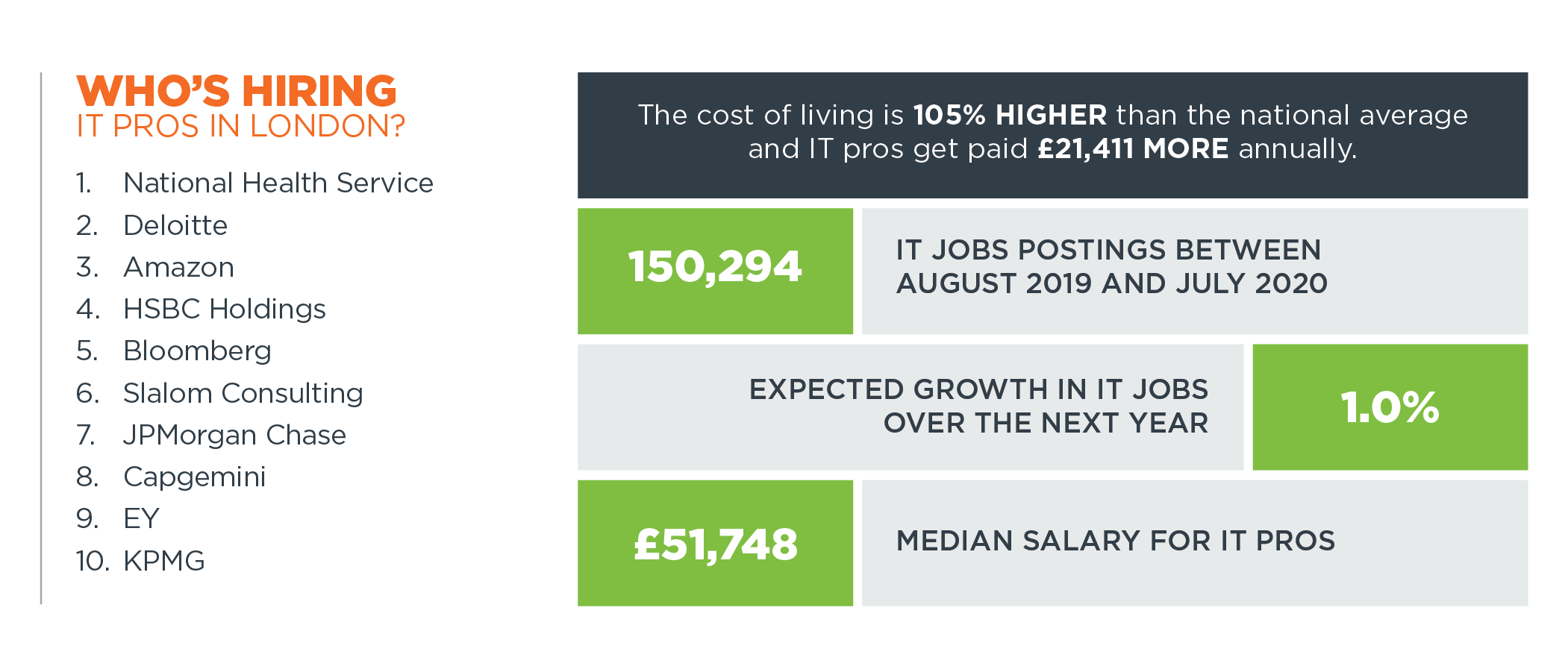 Back to top
Back to top
Bristol has countless things going for it. The city is a manageable size; not too small and not too big, but with many of the cultural perks of a larger city like theatre and shopping, and the lifestyle benefits of a smaller city like walkability and green space. It’s a mere stone’s throw from some of the country’s most desirable holiday spots like Devon and Cornwall. And the jobs scene here, all things considered, is relatively robust. In the last year, nearly 13,500 IT jobs were posted in the travel-to-work area for Bristol, with a city-wide jobs growth rate that’s comparable to that of bigger cities like Belfast or Birmingham. IT workers in Bristol can expect to earn a median annual salary of £41,600, which is 37% higher than the UK average across all occupations.
This city’s location, burgeoning jobs scene, easy rail links to London, and overall desirability have also all contributed, though, to a rising cost of living, which partially accounts for its slide down the list from No. 2 in 2019 to No. 8 this year. In fact, last year Bristol’s cost of living was 19% higher than the national average, but has spiked up to 25% in 2020. The average cost of a home in the Bristol area sits just shy of £300,000, making it costlier than even Cambridge or Edinburgh, and for some scrappier startups and new IT pros, that may be too far of a stretch to make a move worthwhile.
Still, we’d be remiss if we didn’t mention that several lucrative sectors within tech have taken note of the advantages of doing business in Bristol and have become firmly established area players. Namely, the list of employers posting the most IT jobs in and around Bristol is dominated by aerospace and defence firms, with MBDA Missile Systems, multinational defence company QinetiQ, Boeing, BAE Systems and Airbus represented. Other employers who are hiring lots of IT pros include British Telecom, LLoyds Banking Group, global energy company Baker Hughes, and the University of Bristol. The University of Bristol is a red brick research university with strong ties to local industry and to the city itself. In fact, a number of interdisciplinary research institutes are emerging locally, including the Bristol Digital Futures Institute, which is jointly led by social scientists and engineers and aims to “consider the interface of the human and the technical.” The nearby National Composite Centre in the Bristol and Bath Science Park also brings IT buzz to the area, given its critical work in the engineering and aerospace fields. Any IT pros looking to relocate to “Bristle” will find no shortage of innovation.
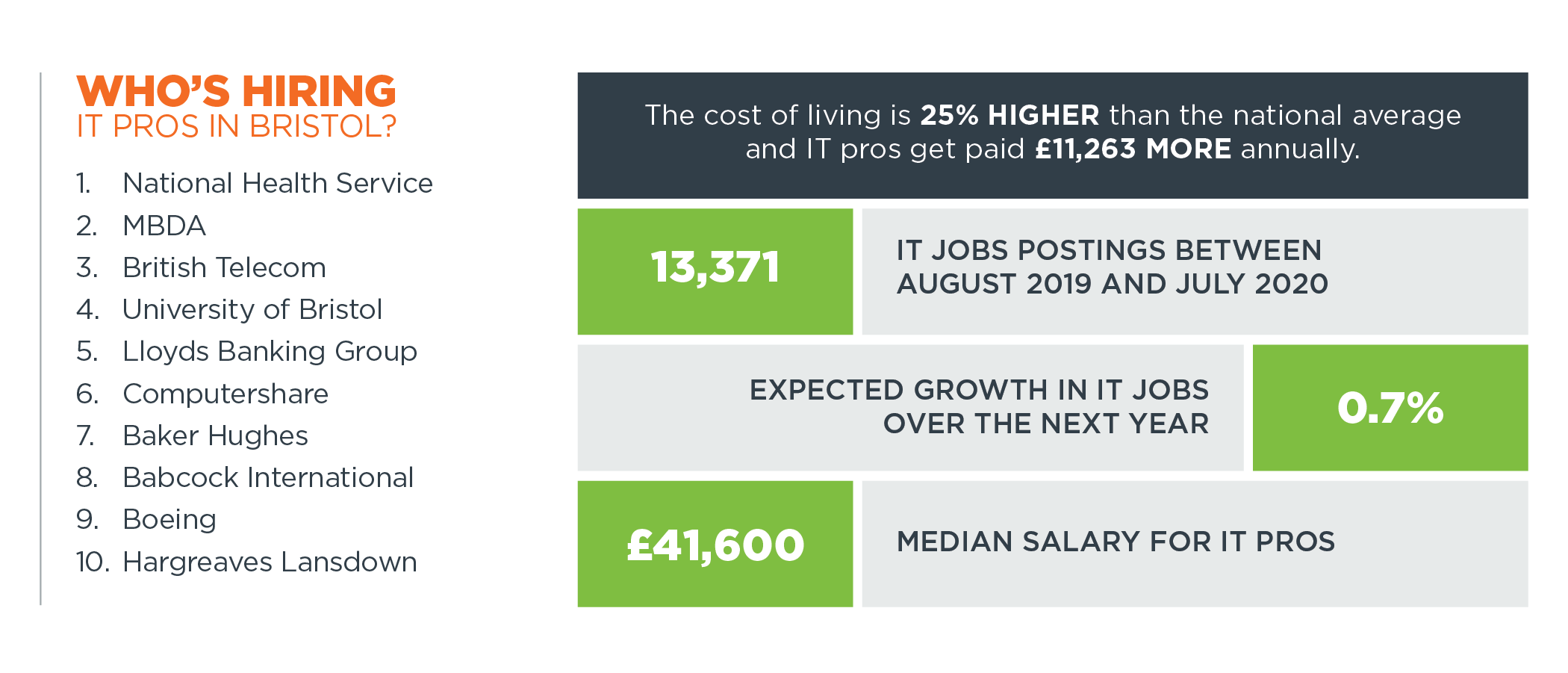 Back to top
Back to top
No longer satisfied with being a far-flung commuter hub for London, this Berkshire market town has dug its feet into the sand and become a top tech location for the second year in a row. Given its prime location within the M4 corridor, it’s no surprise that companies like Virgin Media, Oracle, Prudential, Erircsson, Sage and Microsoft have a presence. Yet, Reading has also enjoyed a diverse startup scene, and is home to VC-backed newbies like Occuity that specialise in diagnostic optical technology, Cloudfactory, an automator of business processes, and point-of-sale marketing platform Ecrebo. The population of Reading is around 342,000, yet nearly 10,000 IT jobs were posted in this area in the last year. In addition, the area’s IT jobgrowth rate is comparable to Manchester, Bristol, or Belfast. A healthy tech meetup scene in Reading (157 meetups happened in 2019 alone) is indicative of a town with its finger on the pulse of the UK tech sector. Specifically, Reading has been praised for its strong presence in AI, cybersecurity, and financial technology.
IT pros working in and around Reading can expect to earn an annual median salary of £46,385, which is a whopping 53% higher than the national average across all occupations, and lower than only London and Cambridge on our list. Yet, the cost of living is significantly lower than London (a house in the Reading area costs £321,165 on average, compared to London’s £489,159). Unfortunately, that cost of living isn’t low enough to justify a better standing on this list, particularly in light of how far your money will go in other cities like Belfast and Birmingham. In today’s IT world, proximity to London isn’t everything. Being within the gravitational pull of the big city can mean higher overall expense and more densely populated residential areas. Undoubtedly, though, Reading is a strong option for those looking for the suburban lifestyle, and healthy job prospects amongst some of the world’s biggest corporations. And when you consider that Reading is just a 25-minute train journey to London’s Paddington Station, and within direct train journey of both of London’s major airports, the advantages of life here become quite clear for those who crave a healthy work-life balance.
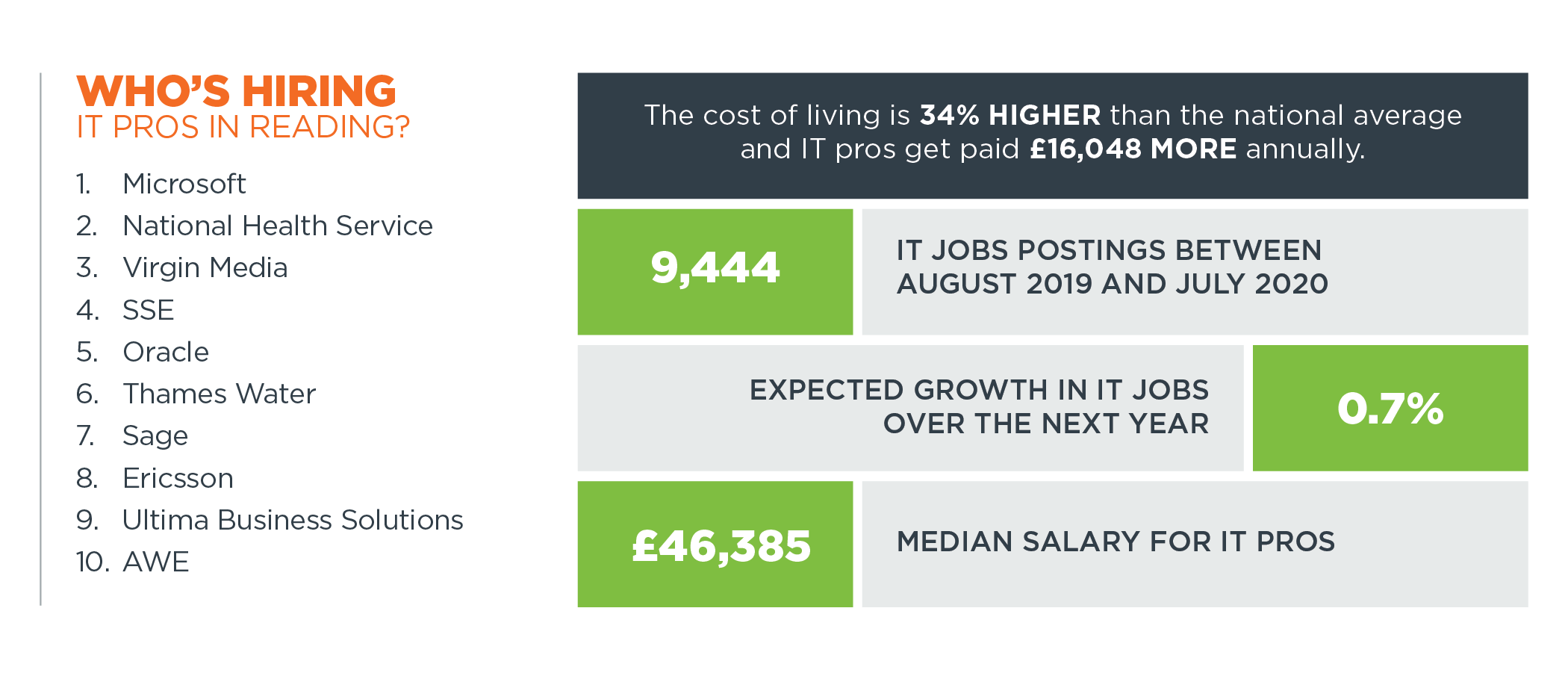 Back to top
Back to top
Roman history lovers and coders alike can feel right at home in Bath, thanks to this idyllic town’s continued standing as a top UK Tech Town. Bath is quaintly nestled in the Avon River Valley, just over an hour’s train journey from London, and within even easier reach of the city of Bristol. The town’s thriving startup culture, proximity to several world-class universities, and overall desirability have done much to make it a strong contender for anyone hoping to work in IT. If all of this sounds too good to be true, that’s because, for some, it might be. Bath may be on the list, but it’s barely there, thanks to a high cost of living, slower jobs growth, and fairly average wages for IT workers. The average home in Bath will set you back £349,266 (second only to London’s average) and the median annual wages are £41,878—less than one might earn in Birmingham, London, Cambridge, Reading or Manchester.
While the University of Bath and the National Health Service (NHS) are hiring the most IT pros in this town, the other employers topping the list include industrial equipment manufacturer Rotork, British media company Future, aerospace and defence giants BAE Systems and Northrop Gruman. The aerospace presence here, in fact, is indicative of a bigger sector trend across the southwest of England and nearby Bristol. Bath Spa University, human data science company IQVIA, and UK Research and Innovation are also doing lots of IT hiring, highlighting the strong academic focus and thread of innovation that runs throughout Bath, Bristol and the Southwest.
But given that Bath is among the smallest towns on our Tech Towns 2020 report, its standing on the list is impressive. While the cost of living may prohibit many people from making a move to the area, those who can afford to do so are certain to enjoy the many perks of living and working in this culturally rich and tech-savvy Somerset hub.
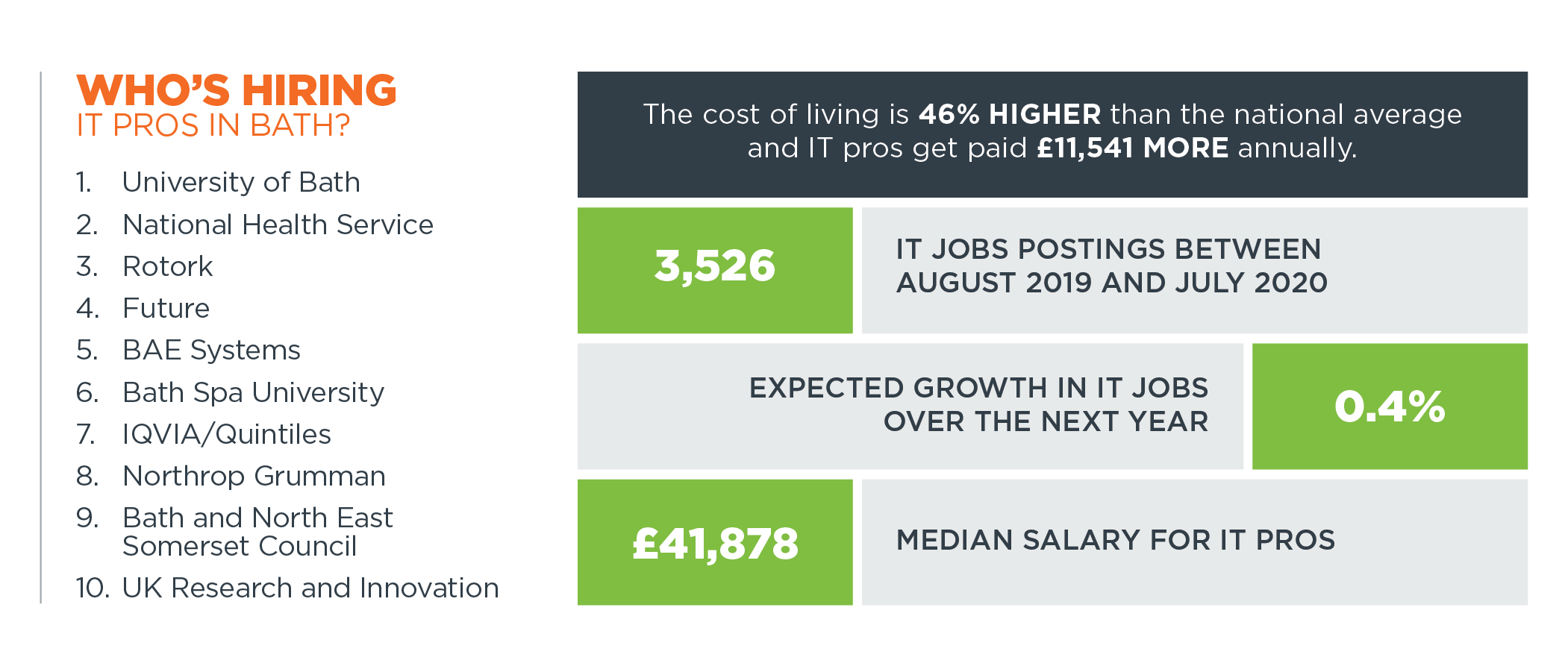 Back to top
Back to top
COVID-19, in addition to being a global tragedy, has deeply disrupted the ways in which we’ve all become accustomed to working and professionally interacting with each other. Starting as early as March, countless employees were told to stay home and to turn their kitchen/bedroom/closet-of-choice into a makeshift office, and in some cases, to share it with both a partner and children who were working or studying from home. The rapidity of that shift, for many, was less than ideal, and while some people are no strangers to remote working, others found themselves struggling to adapt to this new digital workplace and all its challenges.
Yet this trend is undeniably shifting the landscape of all of the Tech Towns on our 2020 list and has the potential to change, likely for the better, the shape of our industry and the business world for decades to come. It is important that we acknowledge this rapid shift as part of a bigger trend that’s been brewing for years, even if it has been hastened along by external forces. (After all, who among us doesn’t know or work with someone who routinely worked from home, long before the pandemic?) And now, after months of testing out “work from home” (WFH) en masse, many companies are deciding that this is actually working quite well. Others are going so far as to permanently close offices. In other words, remote work is likely to continue growing in popularity, and it has a LOT of things going for it. Flexibility of location, zero commute (and therefore no commuting costs), and, for better or worse, an undeniably cozier bond with family members.
In the past year alone, around 88,000 UK-wide IT jobs were posted using keywords “remote”, “WFH”, or “work from home.” The number of postings rose steadily quarter-on-quarter and rose dramatically from 2019. Around 19,000 “WFH” jobs were posted in Q1 of 2020 (compared to just 11,000 posted in Q1 of 2019), around 24,000 were posted in Q2 of 2020, and an impressive 42,240 jobs were posted in Q3 of 2020 (compared to only 13,000 posted in Q3 of 2019).
Of those jobs, the median advertised salary was £47,500, which is slightly higher than the average of £44,500 across all IT job postings. More than 6,000 of the jobs advertise a salary that’s upwards of £90,000, and nearly 2,500 are in the £80,000-£89,999 range. These jobs offer the flexibility (in theory) to work from anywhere in the UK, but around 21,000 of those jobs were posted by companies in the travel-to-work area for London, and the rest were fairly evenly distributed across the other major cities on our list. Still, with more than 200 work areas in the UK, there are many fantastic locations for IT pros to work and live that don’t appear on this list. For instance, employers around Nottingham, Glasgow, Sheffield, Liverpool, and Cardiff were also advertising IT job opportunities, including remote postings. Applying for remote work within a specific geographical area means that anyone craving the ability to dip into and out of an office, or at least to have a theoretical office in the vicinity, has options. The top remote titles listed were programmers and software developers (nearly 40,000 of them), followed by IT user support technicians, web design and development professionals, IT businesses analysts/architects and systems designers.
Many prospective remote employees reading this may be thinking “Amazing. Where do I apply?” Hundreds of UK companies advertised remote IT positions in the last year, with the most prolific job-posters being: The National Health Service, GCI Group, Amazon, Vodafone, Revolut, Team C, Deloitte, Microsoft, VMware, and Telecoms.com.
Clearly, none of us know what 2021 will bring in terms of the pandemic and the widespread impact to businesses or the overall economy, but it’s safe to say we in IT should all watch this space to see how the remote work trend progresses.
CompTIA’s UK Tech Towns Index is a snapshot created to provide some guidance on locations to consider a tech job. It is not meant to measure everything. It gives a unique look into ‘key locations’ as it goes beyond number of jobs and considers factors such as job postings, projected job growth, and cost of living.
The initial ‘top 10’ travel to work areas (TTWAs or ‘work area’) are selected based on location quotient (LQ) using Burning Glass data, i.e. number of job postings over the last 12 months per 1,000 people employed in that work area. A location quotient is a measure of concentration, comparing local concentrations to the national level. All 10 of these work areas have a higher demand than average as far as number of job postings by number of people employed in comparison to the UK.
Additional factors are then considered to develop CompTIA’s ranking among these 10 work areas, including actual number of job ads, projected job growth, and cost of living (CoL).
CompTIA’s Index is based on variables for each of three main factors: hiring demand over last 12 months (IT job postings), projected IT job growth, and cost of living.
Variables Data Sources
Number of IT Job Ads (over last 12 months) Burning Glass
1-Year IT Job Growth (percent change 2019-2020) Emsi | ONS
Cost of Living ONS
Note: Location quotient is the primary factor in determining initial list of 10 work areas to assess, i.e. number of IT job ads per 1,000 people employed.
After the pool of 10 work areas is determined using location quotient data from Burning Glass, CompTIA ranks each of the three variables above from 1st to 10th for each work area. The mean average is then figured among all three variables per work area. The resulting mean average, or score, per work area then determines the overall ranking for CompTIA’s final list.
CompTIA’s Index is based on data available as of September 2020, with the exception of cost of living/housing price data available as of October 2020. The availability of data was a factor in the output.
On the occasion when the mean average ties, the work area with the lower cost of living is ranked higher.
CompTIA’s Index is based on core information technology (IT) occupations. This covers positions such as the following:
In addition to Burning Glass information on job postings, they provide “postings/people employed in a given area and location quotients. Together, these can help make sense of raw posting counts, and provide a picture not just of how job postings are distributed across geographies, but how particular types of jobs are concentrated relative to the average, nationwide distribution and where a particular job is advertised more frequently than one would expect given the size of the employed population.”
Job posting data is a useful, but an imperfect proxy for job demand. Not every posting translates to a new job; hiring firms may change their plans, post multiple times for the same job, hire internally, try different approaches to find the right candidate and so forth. Also, one ad may be posted for multiple openings. Burning Glass addresses many of these issues, but not all.
Additionally, within a time period, there may be situations where a worker is hired, the person isn't the right fit and is let go, and a firm starts the process over again. In the aggregate there is single position, but using job posting data, it may appear there are two positions. CompTIA recommends using job posting data in conjunction with employment data to get a more complete picture of labour dynamics for a given occupation category.
CompTIA subscribes to numerous data sources including Burning Glass and Emsi. In addition to these sources incorporating UK government data such as from the Office for National Statistics (ONS).
The cost of living for the UK is primarily determined by the average price of housing as provided by the ONS Housing Price Index. Consider that UK might not have as many cost of living differences as a larger region such as the US may have, hence CompTIA’s use of house pricing as a leading indicator for differences across the region.
CompTIA rolls up data available at the county/unitary authority level to respective work areas as needed. Still, there are more than 200+ work areas in the UK.
There are many factors to consider when evaluating wages. In addition to location, wages vary based on occupation, industry, company size, etc., as well as individual factors such as experience and education.
For additional UK IT labour market insights, see CompTIA’s quarterly UK IT Employment Snapshot.UK Tech Town Index 2019
Tech Priorities in the UK
UK Business Technology Community
Read more about IT Workforce & Diversity.
Tags : IT Workforce & Diversity